Library
All resources
1461 – 1480 of 2423 results
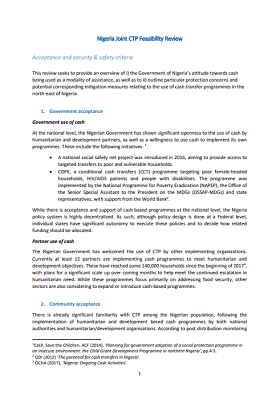
Nigeria Acceptance And Safety Assessment
Guidelines and Tools
This review seeks to provide an overview of i) the Government of Nigeria’s attitude towards cash being used as a modality of assistance, as well as to ii) outline particular protection concerns and potential corresponding mitigation measures relating to the use of cash transfer programmes in the
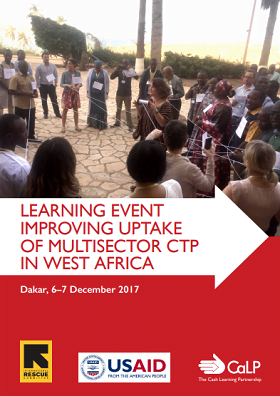
Improving Uptake of Multi-Sector CTP in West Africa: Learning Event Report
Report
In December 2017, the CALP Network and the IRC came together to organize a two-day learning event to align understanding and share experiences of countries working on the definition of Minimum Expenditure Baskets, and to contribute to bridging capacity gaps in Market Analysis, a critical step for CTP...

Cash and Education in Somalia, Somalia Education Cluster (October 2017) – CTP in the education response
Report
Two-page briefing on cash and education in Somalia

Cash alone is not enough: a smarter use of cash
Guidelines and Tools
Cash based interventions (CBIs) enable crisis affected people to make choices and prioritise their own needs. They also support markets critical to survival and recovery of communities. NRC is committed to increasing the use of cash across its programmes. Yet, cash based interventions are not a...

Interim Guidance Note on Determining Cash Transfers Values for Food Security
Guidelines and Tools
The objective of this guidance note, as laid out in the Terms of Reference, is to: Leverage FSC partners’ knowledge and experience to develop guidance on cash transfer value logic for both unconditional and relevant food security cash for work/assets3 programming. It focusses on acute food insecurity...
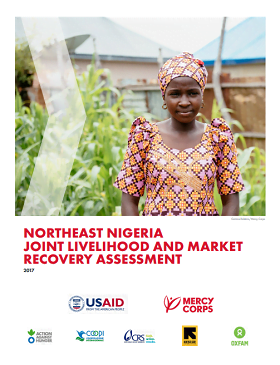
Northeast Nigeria joint livelihoods and market recovery assessment
Report
Mercy Corps Nigeria, in conjunction with Action Against Hunger, Cooperazione Internazionale, Catholic Relief Services, the International Rescue Committee and Oxfam undertook the assessment across the three most affected states in Northeast Nigeria; Adamawa, Borno and Yobe, to better understand...

Response Option Analysis for Jere, Konduga and MMC (Borno), Inter-sector Workshop
Guidelines and Tools
In March 2017, the Consortium began the pilot in Nigeria with the aim of providing technical and strategic support to country-based humanitarian organisations, enabling them to engage in collaborative assessments and decision making. Whilst the Consortium has not been conceived to provide direct...

The Role of Financial Services in Humanitarian Crises
Guidelines and Tools
More than 75 percent of adults who live in countries that are coping with humanitarian crises remain outside the formal financial system. Financial inclusion would provide both refugees and residents with a diversified set of financial products (including savings, remittances, credit, and insurance) that...
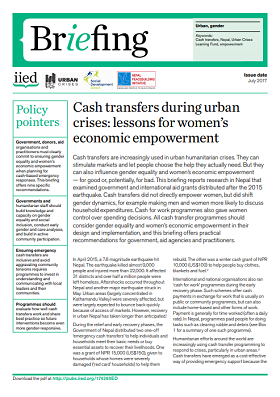
Cash Transfers During Urban Crises: Lessons for Women’s Economic Empowerment
Guidelines and Tools
Cash transfers are increasingly used in urban humanitarian crises. They can stimulate markets and let people choose the help they actually need. But they can also influence gender equality and women’s economic empowerment — for good or, potentially, for bad. This briefing reports research in Nepal...

Afghanistan Inter-Cluster Cash Post-Distribution Monitoring (PDM) Questions
Guidelines and Tools
Post-Distribution Monitoring questions. Afghanistan 2017

E-transfers Procurement Learning and Good Practices
Guidelines and Tools
Humanitarian agencies have increased their use of cash transfers and related distribution technologies. Yet, most rely largerly procurement and contracting processes designed for goods and professional services. An Elan Survey of humanitarian operations staff and e-transfers providers indicated several...

Promoting positive parenting practices in Niger through a cash transfer programme
Report
In 2011, the Government of Niger set up a national social safety net
programme – the ‘Projet Filets Sociaux’. It includes unconditional cash transfers as well as behavioural change measures to promote investments in children. Lessons from programme implementation and evaluations so far highlight...

Responding to Drought in Kenya Using Cash and Vouchers: Learning from Previous Responses
Report
This paper provides a summary of 100 recommendations, lessons and observations from evaluations that have looked at the use of cash and vouchers in drought responses in Kenya. The reports which were reviewed considered the use of cash and vouchers in drought related responses in urban and rural areas;...

Kenya Red Cross Society Using New Technology to Reach Communities in Hardship Areas
Report
Kenya Red Cross Society responded to the severe drought through cash transfers in Marsabit county. Unlike an earlier drought, where KRCS used manual system to pay beneficiaries in the same geographical area, this year the organisation used a payment technology provided by a company called Compulynx....

Cash transfer platforms in humanitarian contexts
Report
This report is based on ten days of desk-based research prepared for the Australian Government that aims to respond to the following questions: What is the rationale for using multi-purpose cash transfers and single platforms? What is driving donor agency positions on these issues? What is the evidence...

Guidance to Partners Funded by ECHO to Deliver Medium to Large-Scale Cash Transfers in the Framework of 2017 HIPs and ESOP
Guidelines and Tools
The use of multi-purpose cash transfers as a central component of humanitarian assistance is becoming increasingly important, in particular in the context of protracted crises in middle-income countries. Whilst an instrument such as the ESSN (Emergency Social Safety Net) in Turkey certainly represents an...

Is cash better than food vouchers for Syrian refugees?
Report
A comparative analysis of the effectiveness of unrestricted cash and food restricted voucher assistance modalities for Syrian refugee households’ food security in Jordan and Lebanon.

White Paper on Cash Coordination
Report
As more agencies are using cash transfer programming in humanitarian contexts, the need for coordination has grown. Aid organizations have set up cash working groups in many emergency settings that often differ in terms of leadership and institutional setup. This ad hoc approach has helped provide...
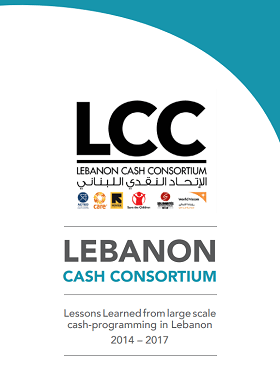
Lessons Learned from large scale cash programming in Lebanon 2014 – 2017
Report
Given the fact that cash is becoming an increasingly used modality in humanitarian
interventions, coupled with the evolution of the funding model for cash assistance in Lebanon, the former LCC agencies find it important to give to cash consortia and cash actors the benefit of the unique experience that...

Rapid Market Assessment Sofala Province, Mozambique
Report
The joint TDY between USAID/FFP and FEWS NET Mozambique to Sofala Province, Mozambique had two distinct objectives:
1) Assess current food security and market conditions including:
a) Scale of humanitarian assistance relative to needs
b) Understand maize market structure, conduct and performance
c)...